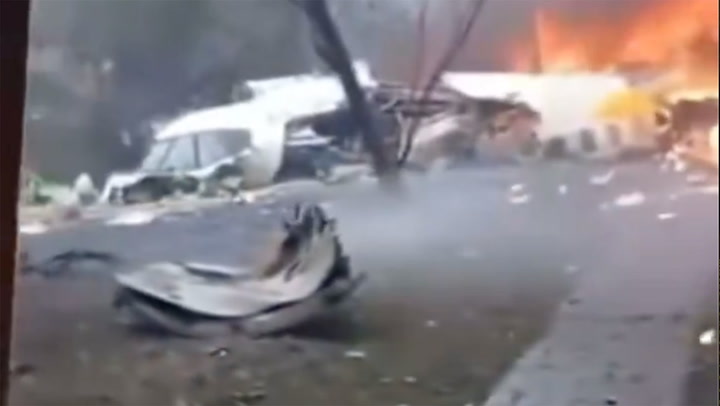SAO PAULO, (Reuters) – A regional turboprop plane crashed near Sao Paulo in Brazil today, killing all 61 people on board, the airline said.
Regional carrier Voepass said the plane, bound for Sao Paulo’s international airport, took off from Cascavel, in the state of Parana, and crashed at around 1:30 p.m. (1630 GMT) in the town of Vinhedo, some 80 km (50 miles) northwest of Sao Paulo.
Video shared on social media showed the ATR-72 aircraft spinning out of control as it plunged down behind a cluster of trees near houses, followed by a large plume of black smoke.
Nearby resident Daniel de Lima said he heard a loud noise before looking outside his condominium in Vinhedo when he saw the plane in a horizontal spiral.
“It was rotating, but it wasn’t moving forward,” he told Reuters. “Soon after it fell out of the sky and exploded.”
City officials at Valinhos, near Vinhedo, said there were no survivors and only one home in the local condominium complex had been damaged while none of the residents were hurt.
“I almost believe the pilot tried to avoid a nearby neighborhood, which is densely populated,” de Lima said.
Authorities did not immediately say what had caused the crash, though Sao Paulo state official Guilherme Derrite said the plane’s “black box” had been recovered and that it seemed to be intact.
The video of the crash showed clear weather, with the forecast for the area calling for light rainfall and winds of 10 km per hour (6 mph).
John Hansman, a professor in the department of aeronautics and astronautics at Massachusetts Institute of Technology, reviewed some of the footage shared on social media and without having reviewed flight data said the crash did not appear to have been caused by weather.
“It may have been an engine failure on one side that was mismanaged by the crew,” he said. “It could be the thrust of the remaining engine that started the rotation downward.”
U.S. aviation safety consultant and former commercial pilot John Cox said he would want to validate the Flightradar data, which showed a lot of gyrations in speed, but regardless, something “really significant” happened to cause the plane to spin when it came down.
“We don’t spin airliners,” Cox said. “So that says at some point it stalled and then the flight crew lost control of it. But it appears that there may have been some catastrophic event before that loss of control.”
Voepass, Brazil’s fourth-largest airline by market share, said it could not provide any additional information on what caused the plane to crash. It had originally reported 62 people aboard the aircraft.
Franco-Italian ATR, jointly owned by Airbus AIR.PA and Leonardo LDOF.MI, is the dominant producer of regional turborprop planes seating 40-70 people.
ATR told Reuters that its specialists were “fully engaged” with the investigation into the crash and its customers.
The crash is Brazil’s deadliest since 199 people were killed in 2007 on a flight operated by TAM, which later joined LAN to become what is now LATAM Airlines.

